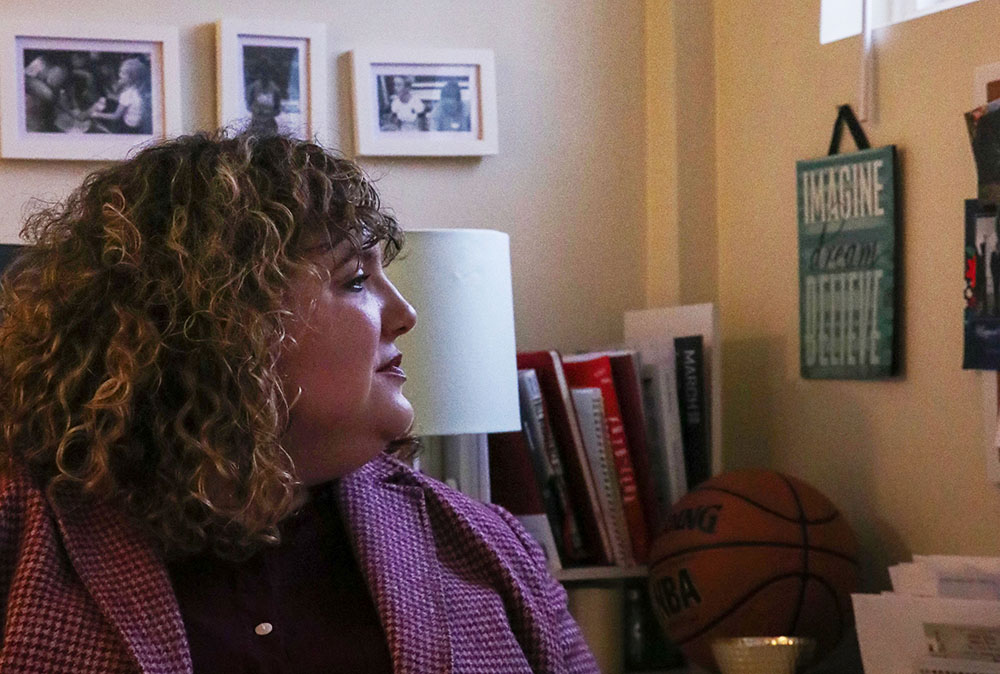Play
 Lindsay Gibbs. Photo by Kelsey Cochran.
Lindsay Gibbs. Photo by Kelsey Cochran.
Lindsay Gibbs Gets Real About Women in Sports
March 8, 2020 @ 4:45pm
There’s nothing atypical about Lindsay Gibbs’ early relationship with sports. Growing up in the North Carolina Triangle, she consumed Blue Devils vs. Tarheels basketball games and came of age during the early days of the Carolina Panthers, of which she became a superfan after her dad used corporate tickets to feed her enthusiasm for the shiny expansion team. She fed her burgeoning obsession with teams and players with highlights on ESPN’s “SportsCenter,” and news clippings from the local paper.
Fast forward to her future career, and there’s nothing typical about how Gibbs evolved from NYU film student into a bonafide sports reporter. Upon graduation during 2008’s “Great Recession,” the aspiring filmmaker found steady work as a freelance writer covering professional tennis. She parlayed that platform into a full-time gig at the now defunct ThinkProgress, where she enthusiastically bucked the “stick to sports” mandate chanted by sects of the Internet. Though she’s always been adept at recaps, previews and the like, Gibbs truly shines when she’s able to explore a subject most fans turn a blind eye to: Sexism in sports.
“There were people already doing this work, I was late to it,” Gibbs tells me in her Northwest apartment, which doubles as her office and recording studio. “Once I started thinking about things through that lense, I started questioning [the disparity] a lot. Once I realized how much the media is controlling our narratives, I started questioning everything I had grown up thinking.”
Now based in D.C., Gibbs is easily one of the most prominent voices in sports media covering the topic, providing a constant stream of content investigating this vast inequity. Her work has bestowed the front pages of prominent media outlets such as The Athletic and The Ringer, to name a few. Since October, Gibbs has shifted focus toward her self-published newsletter Power Plays, which delivers three times per week for paid subscribers, chalk full of original articles and essays.
Gibbs describes it as a “no-bullshit newsletter,” a full-time job where she monitors other publications for women’s coverage, tackles institutions like the NCAA and asks questions such as “Remember When Billie Jean King Founded a Pro Softball League?” The newsletter is published via Substack, a popular platform for independent writers.
“There’s a lot of work that individual people are doing that makes me hopeful, but overall I’m concerned,” Gibbs says. “People seem to care only about shareholders and profit, and that’s not a way to do any good journalism. I want businesses to be healthy, but that can’t be the only thing.”
According to Gibbs’ About Page, women only account for 4 percent of all sports media coverage. The title comes from this mission to look analyze this issue from a systemic view, with an overall goal to explore how decisions are made when covering and talking about women in sports on a daily basis. To no surprise, people were hungry for the content, especially because of a lack of coverage when compared to male athletes.
“This point of view is open about the fact that the place that women have in sports didn’t happen by accident,” Gibbs says. “Decisions [are] made all the way up the line on a daily basis by people in power to keep them marginalized. It’s intentional to undo this.”
Gibbs is also one of the rotating hosts on the “Burn It All Down” podcast, a feminist sports program that includes voices from Brenda Elsey, Jessica Luther, Shireen Ahmed and Amira Rose Davis. With each touting a different background, the conversations are often multifaceted in a way that most sports podcasts simply aren’t, making it a unique experience for listeners.
“It started as a support group,” Gibbs says. “We just kind of became each other’s daily check-in and daily discussion thread. The lack of diversity in sports radio and sports podcasting is excruciating, so we thought it would be important to not have any cisgender men on the show.”
With nearly 150 episodes worth of content, the show is an example of the point of view Gibbs champions: There aren’t more women in sports media because it’s not a point of emphasis for the goliaths in the industry. And while Gibbs is doing her part to use her voice and platform to tell these stories, she’s concerned about the overall landscape.
“It’s great that individuals can make a name for themselves on Twitter and that places like Substack support work [similar to mine], but this needs to be supplemental work. We need newsrooms and lawyers, and infrastructure. You used to have Vice Sports covering these issues, you used to have Deadspin and Sports on Earth. There used to be more of an ecosystem.”
By switching to a paid subscription model, Gibbs is now completely reliant on readers to pay her bills. She needs what every other media outlet strives for: clicks, shares and reposts. She mentions rent and travel expenses, but she also wants to use her newsletter as a proving ground .
“It makes me feel pressure to succeed not just for me, but for other people. I need other people to see it and read this work, I need to lift up other voices. It makes it feel much more vital.”
Visit www.lindsaygibbs.com and follow her on Twitter @linzsports. To sign up for Power Plays visit www.powerplays.news. Free for one weekly newsletter on Monday, $8 per month for weekly newsletters on Monday, Wednesday and Friday.







